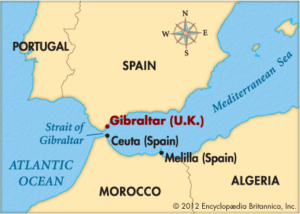Spain National Budget to Push Ceuta and Melilla as Online-Gambling Hub
Spain is set to toss another virtual territorial hat in the ring as a possible hug for Euro-facing online gambling operations by slashing the taxes on gross gaming revenue (GGR) to be charged by operations in Moroccan coastal enclaves of Ceuta and Melilla.
The two small territories on north Africa’s Mediterranean coast have been Spanish possessions for centuries, and each has operated as a Spanish Autonomous City since 1995. The two cities’ existence as a part of Spain is a result of historic wars in the region and are a continuing part of a centuries-old possession dispute with Morocco, just as Spain disputes the United Kingdom’s possession of Gibraltar, which is roughly across the mouth of the Mediterranean sea from Ceuta.
 The roughly 160,000 residents and the businesses incorporated in Ceuta and Melillo already receive special tax breaks from Spain, and the tax break appears designed to allow possible corporate online-gambling refugees from Gibraltar a long-term option should that protectorate’s post-Brexit market turn sour.
The roughly 160,000 residents and the businesses incorporated in Ceuta and Melillo already receive special tax breaks from Spain, and the tax break appears designed to allow possible corporate online-gambling refugees from Gibraltar a long-term option should that protectorate’s post-Brexit market turn sour.
Gibraltar and UK authorities agreed last month to a “continued access” deal with the rest of the United Kingdom, to run through 2020. However, changes in the UK’s remote-gambling taxation rules have made Gibraltar generally less attractive to online gambling operators, with jurisdictions such as Malta emerging as online hubs.
Whether the halving of taxes related to online-gambling operations in Ceuta and Melillo will allow the two small enclaves to compete against very friendly tax regimes such as Gibraltar and Malta remains to be seen, but at the very least, it might offer companies a cheaper road to entry into the firewalled Spanish online market. The proposed tax cut, included in Spain’s yet-to-be-approved Draft National Budget 2018, would slash the effective rate on GGR. The draft form of the budget was finalized earlier this month, and is set to go into effect with the start of Spain’s new fiscal year on July 1, 2018.
Currently, the rate on GGR for activities such as online poker and fixed-odds sports betting are at 25% for Spain’s regulated gambling operators. According to a summary at Loyra Abrogados, that rate would be trimmed to 20% under the new budget’s language. However, for any company willing to physically relocate to either Ceuta or Melillo, that tax rate on GGR would be cut all the way down to 10%.
The actual (translated) text of the proposal is brief, and is tied to the pre-existing “half taxes” allowances for Ceuta and Melillo in other areas:
“The amounts of the fees on the game are reduced by 50 percent, collected in Royal Decree-Law 16/1977, of February 25, which regulates the criminal, administrative and fiscal aspects of games of chance, stake or chance and bets, reduction whose purpose is to move to the Autonomous Cities of Ceuta and Melilla the tax benefits that are collected in other taxes for them.”
It doesn’t quite work out to a 50 percent reduction when all special categories are considered, but is designed to be tied in broad terms to the special rates in other enclave-related interests. The Loyra Abrogados summary states potential online operators are only the second-largest beneficiaries of the proposed budget changes, after “TV’s” — television-based “call to win” programs popular in Spain that offer prizes to participating viewers.
Approval of this clause in the draft budget could theoretically open the door for other land-based casinos to consider building destination venues in the two enclaves as well; however, physical land space would be an overriding concern. Ceuta occupies 18.5 square kilometers (about 7.1 square miles), and is already home to Luckia’s Gran Casino Ceuta. Melillo is a third smaller, at 12.1 square kilometers (about 4.7 square miles). Both autonomous cities are former “free port” zones with significant portions of their available land already dedicated to shipping and military interests.




















COMMENTS